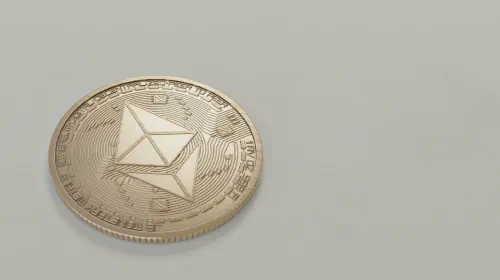3 Ways Blockchain Supports Artificial Intelligence
Salomon Kisters
Jun 27, 2022This post may contain affiliate links. If you use these links to buy something we may earn a commission. Thanks!
Almost everyone who is using computers these days has heard about artificial intelligence at some point.
Advances in computing power have paved the way for intelligent computer systems that can process large volumes of data to learn new patterns. These learned insights can be further used to make critical decisions.
In this article, we’ll explain how blockchain is supporting the development of AI. Let’s look at the basics of each of the two technologies.
What is Artificial Intelligence?
Artificial Intelligence, or AI, in short, is a field of computer science in which programmers configure machines with problem-solving skills. The goal of making these configurations is to confer human decision-making abilities to computers.
AI has sub-disciplines like machine learning and deep learning that are used to create data models that train machines in making predictions for solving problems. These disciplines use computational methods involving neural networks in an attempt to imitate neurons in the human brain.
Artificial Intelligence is becoming an integral part of our lives
Tech companies are increasingly using AI to automate many processes that normally require human intervention.
AI can be used to create robots that make complex gadgets with precision or perform human-level tasks such as recognizing objects and voices.
And AI can be used to answer common questions by data mining from a search engine and even create chatbots for having a conversation in real-time. AI-based virtual assistants like Siri and Alexa are household names.
There is an incentive for researchers and businesses to integrate it with new technologies to collect massive amounts of data to learn from it. Using powerful computers and devices amplifies the potential of AI.
In short, AI is everywhere. The proliferation of AI-powered machines is now affecting many facets of our lives, even though we may not be realizing it ourselves.
What is Blockchain?
Blockchain technology has been gaining traction in both the technology sector and mainstream media. While the concept of blockchains is not new, modern blockchains make use of a decentralized network of computers that stores an automated ledger for financial transactions.
The blockchain ledger automatically records transaction data without the need for a person to verify transactions. Each transaction is authenticated using cryptographic algorithms.
Users typically do not require permission to use the network, and the network is secure and trusted due to the built-in encryption.
Transactions records can also be accessed by the public if the blockchain is open source, making the ledger transparent.
Blockchains are behind innovative technologies
One of the early mainstream uses of distributed ledger systems was the creation of digital currencies like Bitcoin and Ethereum. The introduction of a new asset for trading opened up new doors to e-commerce as it eliminated the role of conventional banks.
Over the years, many cryptocurrencies have emerged and are traded over dozens of exchanges. Blockchains are versatile and have evolved into multi-layered applications that can perform several tasks like tracking orders, production processes, creating digital assets, and executing contracts.
Today, there are many blockchains like Ethereum and Solana that are powering decentralized financial institutions - entities that function like automated investment banks.
Combining Blockchain and AI
The use of AI in blockchain applications is a natural path of technological progression. The two technologies clearly synergize with each other while helping to create useful applications that have a lot of industrial utility.
- Blockchains create and store data over a distributed network of computers in a trusted manner.
- The AI uses the data gathered from the computer network to make complex decisions.
- The AI learns with experience to make better decisions.
Let’s look at the three synergies that allow blockchain to support AI in more detail.
Authenticity
As we mentioned earlier, blockchains are a trusted source of information. Completely decentralized blockchains are almost tamper-proof. This is important as AI systems are highly reliant on data.
In other words, if data inputs to an AI are designated as truth, then blockchains represent a far more reliable model of truth data. An authentic data source will be far more valuable when training an AI.
In contrast, an untrustworthy data source will create problems when training the AI, leading to undesired results.
Another feature of blockchains is transparency. That means that blockchain data has an intrinsic audit trail. This is useful for tracing anomalies in datasets.
Automation
A blockchain executes automated transactions using computing resources. AI can use key performance indicators to optimize computing resources.
To achieve this, the AI uses another technical layer that enables data models to predict thresholds for specific events. Once a threshold value is met, specific events can be automatically triggered.
In this way, AI can redistribute transaction loads to other computers in the network or instruct a specific computer to perform an additional task.
This can reduce the carbon footprints of the blockchain hardware by lowering power consumption and speeding up transactions over the blockchain.
There are many situations where AI can bring efficiencies to the system:
- Inventory levels can be automatically refilled through re-orders if demand is predicted to be high or when products have expired.
- Transaction fees can be incurred after a contractual obligation has been completed.
- Computer power can be lowered if network loads are low enough.
- Malicious users can be detected earlier.
- Disputes can be resolved on a set criterion.
Augmentation
The role of an AI is to gain knowledge after making several decisions. Therefore, the capability of an AI is augmented over time.
AI can provide valuable insights from data generated by one blockchain network. These insights, in turn, can be combined with data from other sources outside the blockchain to create more robust intelligence models.
The result is a scalable and interoperable way to use AI for multiple projects. Blockchains can be combined with cloud-based technologies to transparently share data to improve AI systems.
These three facets of blockchain-based AI create a demand for vertical and horizontal industries that empower professionals from a range of domains.
Software engineers, cloud computing experts, hardware solutions providers, data scientists, commodity traders, and researchers are among the many professionals who benefit from the merger of these two technology layers.
Applications of Blockchain and AI
By now, you probably understand the importance of blockchain for the development of AI. Here are a few real-world sectors where blockchain and AI are already playing a combined role for the benefit of all stakeholders.
Healthcare
With patient data stored on the blockchain in the form of electronic medical records (EMR), AI is helping companies to analyze patient data to get actionable insights. Information from AI-powered insights can be used to predict and improve patient health outcomes.
There’s another benefit to using blockchain-based EMRs: privacy. Patient records are encrypted and secure from hacks. Companies like Patientory are already using the power of both technologies to help people take charge of their health.
Pharmaceutical Industry
The pharma industry is harnessing the power of blockchain and AI in many ways. These include counterfeit drug detection, clinical trial consent, data validation, and collaborative machine learning projects for understanding the biological effects of small molecules.
Supply Chain
Blockchains allow supply chains to trace components to their origin in a secure manner. Many companies are also sharing their supply chain data over consortium networks that use big data to provide intelligent solutions to partnering vendors.
AI is powering solutions to automate loading ports, demand and supply analysis, and quality control systems for transported goods.
Finance
AI is leading the way in the fintech industry with many blockchains that use AI to optimize operations. The use-cases in this sector include fraud detection, credit risk assessment, customer relationship management, account security, and regulation.
Using AI with blockchain has allowed banks and small businesses to quickly scale up their operations while saving costs on operational overheads.
AI Marketplaces
Startups like Singulaity.net and Thought AI are putting up AI models for sale on the blockchain. This allows researchers and commercial organizations to purchase AI profiles over a blockchain network to integrate them into their processes applications.
These marketplaces allow companies to transparently apply AI algorithms to create efficiencies and generate powerful insights. Because the AIs are readily available on the blockchain, integration is easy, and the IP rights of the original developers remain intact.
Conclusion
We’ve only covered the surface of the potential of AI and blockchains. Both technologies are rapidly evolving each year, and smart people continue to find new avenues to utilize their strengths.
It might always seem too early to predict the future of blockchain and AI, but one thing is for sure: the two technologies will continue to support each other in the long term. They are here to stay.
Stay informed with the latest insights in Crypto, Blockchain, and Cyber-Security! Subscribe to our newsletter now to receive exclusive updates, expert analyses, and current developments directly to your inbox. Don't miss the opportunity to expand your knowledge and stay up-to-date.
Love what you're reading? Subscribe for top stories in Crypto, Blockchain, and Cyber-Security. Stay informed with exclusive updates.
Please note that the Content may have been generated with the Help of AI. The editorial content of OriginStamp AG does not constitute a recommendation for investment or purchase advice. In principle, an investment can also lead to a total loss. Therefore, please seek advice before making an investment decision.

Does Dogecoin Coin Have Utility?
Dogecoin came into being in 2009 with the launch of the first decentralized blockchain, but does it have any utility?

MetaMask - A Comprehensive Guide to the Popular Blockchain Wallet
MetaMask is a popular blockchain wallet with over 30 million monthly active users, providing a secure and convenient way to access and manage cryptocurrencies like Ethereum.

Blockchain Light Nodes: Functions, Types, Setup, and Pros/Cons
Learn about blockchain light nodes, their functions, types, setup, and pros/cons. Understand how they work and their importance in the cryptocurrency ecosystem.
Protect your documents
Your gateway to unforgeable data. Imprint the authenticity of your information with our blockchain timestamp